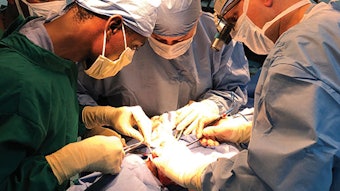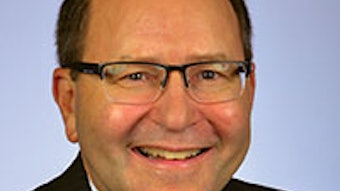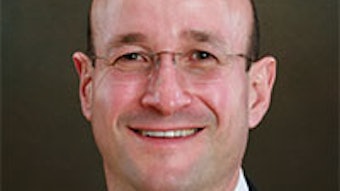A Reg-ent℠ practice perspective: Wyoming Otolaryngology with Cope Norcross, MD
Data is a critical component in today’s ever-changing healthcare environment. Participants using the Reg-ent registry are harnessing the power of data to guide the best ENT care for their patients.
Data is a critical component in today’s ever-changing healthcare environment. Participants using the Reg-ent registry are harnessing the power of data to guide the best ENT care for their patients.

Wyoming Otolaryngology became a Reg-ent participant to do just that. Cope Norcross, MD, learned about the otolaryngology-specific clinical data registry during his attendance at the AAO-HNSF 2015 Annual Meeting & OTO Experience in Dallas, TX. Since joining Reg-ent in 2016, they have reported PQRS 2016 and MIPS 2017 through Reg-ent.
 Cope Norcross, MD
Cope Norcross, MD“In addition to meeting reporting requirements through Reg-ent, one of the other invaluable benefits for us is that if we use it properly, we will be able to show that what we think we are accomplishing in patient care and quality is actually what we are accomplishing,” said Dr. Norcross.
Reg-ent is the only otolaryngology-specific Qualified Clinical Data Registry (QCDR) focused on quality improvement and patient outcomes. As a QCDR, Reg-ent accommodates all required reporting for MIPS 2018 performance categories including Quality, Promoting Interoperability (PI) (previously called Advancing Care Information [ACI]), and Improvement Activities (IA).
Improving quality of life for his patients is at the core foundation for why Dr. Norcross chose otolaryngology. “It matched what I really wanted to do—to have expertise in a specific body area. I get to treat all ages and all stages of life. I build relationships with patients and their caregivers over time. I can perform short, less intricate surgeries or more complex surgeries. Otolaryngology offers the full spectrum of patient care.”
Wyoming Otolaryngology was founded in 1967 and is one of the oldest medical practices in the state of Wyoming. With three practicing otolaryngologists, two audiologists, and a nurse practitioner, they are a busy practice seeing patients who travel within two to three hours of their Casper, WY, office, with symptoms covering the spectrum of general otolaryngology conditions and diseases.
Dr. Norcross joined the practice in 2006, and since then has seen the complexity and increased demands on physicians. “The business of medicine impacts patient care because we have to change what we do to fit the ever-changing reporting regulations. This, of course, takes away from the patient/doctor experience,” he said.
The practice implemented an EMR five to six years ago. Dr. Norcross noted that it did manage to help keep the computer out of the patient/doctor relationship; however, with more complex meaningful use reporting requirements, “we were finding it difficult to adequately report what we needed to report despite having an EMR. Not only did Reg-ent help with reporting requirements working with our EMR, but it demonstrated our outcomes to show that we are an excellent practice.”
Data Mapping
The AAO-HNSF partnered in the development of Reg-ent with FIGmd, Inc., a company that specializes in extracting clinical data from EHRs into clinical data registries. FIGmd provides support to Reg-ent participants for the process of data mapping, where the data that is relevant to the registry is extracted automatically from the EHR and is then transmitted on a scheduled basis directly to the Reg-ent registry and validated for accuracy.
“We had outstanding support from FIGmd in addressing any obstacles and overcoming any initial challenges with the setup of our data mapping. The best advice I can give is that if you put in the time upfront to the setup, then the rest is fairly seamless. We have accomplished more with Reg-ent than we could have done on our own,” said Dr. Norcross.
Dashboard
Reg-ent offers a customizable dashboard that creates a visual representation of each participant’s data, allowing them to view and select all categories of MIPS including Quality, PI, and IA, monitor performance in all three categories, and track performance against Reg-ent registry benchmarks and CMS quality measure deciles.
While indicating that the practice intends to make greater use of the dashboard moving forward, Dr. Norcross noted its value: “Using the dashboard is an easy way for us to tell what is going on with diagnosis codes, meeting all of the standards, and just overall telling us if we are doing a good job.”
The future of reporting with Reg-ent
“The reporting benefit of Reg-ent is a big one. Not only does it capture what we want but it will help us in the future. No doubt that insurance companies will join CMS in quality reporting. They will want to make sure we are good at what we are doing and that we have quality and good outcomes,” said Dr. Norcross.
The data contributed to the registry helps to grow the data repository within Reg-ent that will serve countless purposes beyond quality reporting—to not only define quality patient care and outcomes, but also to demonstrate the value of the care provided.
Wyoming Otolaryngology plans to continue as a participant of Reg-ent for years to come, Dr. Norcross said. “It is cost-effective and offers more and more of what we are required to do in the business of medicine that also translates into improving quality of life and the enhanced care we provide to our patients daily.”












